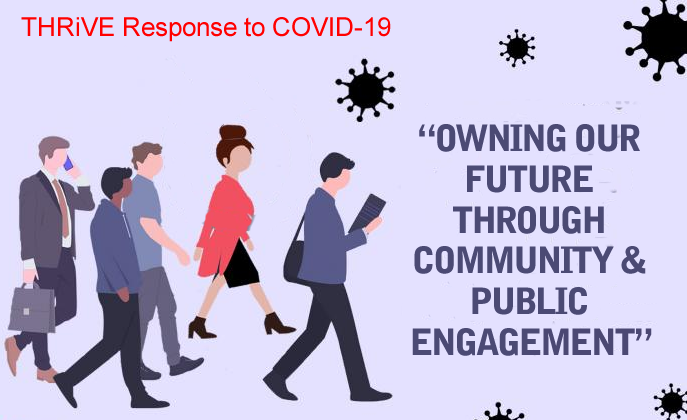
THRiVE has emerged as one of the few institutions who have won Makerere University’s Research and Innovations Fund (RIF) grant to conduct a community study on COVID-19. The new achievement comes on the heels of a proposal that was submitted by the consortium in April following a call for proposals. THRiVE’s project is titled: ‘Owning our future through community engagement: enhancing uptake of COVID-19 prevention and mitigation measures.’
The winning proposal was submitted by the THRiVE team headed by the Principal Investigator, Prof Nelson Sewankambo and Co-PI, Dr. David Kawa Mafigiri. The project will assess the impact of a community engagement risk communication (CERC) intervention among vulnerable populations in Kawempe and Nakawa divisions of Kampala. In doing so, researchers will be able to describe community perceptions and behaviour towards COVID-19, understand the economic and social effects of the pandemic and assess community coping mechanisms to the new social norms. The findings will inform COVID-19 programming across development and humanitarian responses.
“We will utilize participatory approaches to develop community engagement tools to plan targeted community-based risk communication interventions to address poor compliance and low uptake of COVID-19 mitigation measures due to associated negative effects,” partly reads the proposal.
The uniqueness of this study is that THRiVE will promote community participation, ownership and sustainability of the efforts at the grassroots level. This approach will empower communities to take charge of their health and development by owning and committing to the mitigation measures.
In Uganda, COVID-19 is already disrupting livelihoods, particularly among vulnerable populations including those in the informal sector, small-scale agriculture, women, children, the elderly, people with disabilities and the poor living in urban and peri-urban areas. With closure of businesses and a ban on public transport, many people have lost their sources of income. Citizens are beginning to demonstrate and agitate for relaxing the social measures and return to ordinary ways of living. Anecdotal reports in the popular media particularly social media, public agencies and implementing actors’ reports suggest there is low risk perception of COVID-19 in the community.
“To effect change there is a need to creatively engage stakeholders to alter the societal norms and practices by participating in decision making for effective use of social structures, social mobilization and preferred communication methods,” the proposal reads in part.
Necessity of the study:
Previous lessons from Ebola outbreaks in West Africa, Democratic Republic of Congo (DRC) and Uganda reveal that interventions that do not foster community engagement at all levels from early planning are more likely to encounter resistance, disengagement and apathy at the community level. Therefore, this study hypothesizes that that the success of any measures against the COVID -19 require that there is community participation, ownership and sustainability of the efforts at the grassroots level.
It is anticipated that the study will lead attitudinal change in relation to acceptance and implementation of globally proven and recommended measures to prevent COVID-19.
